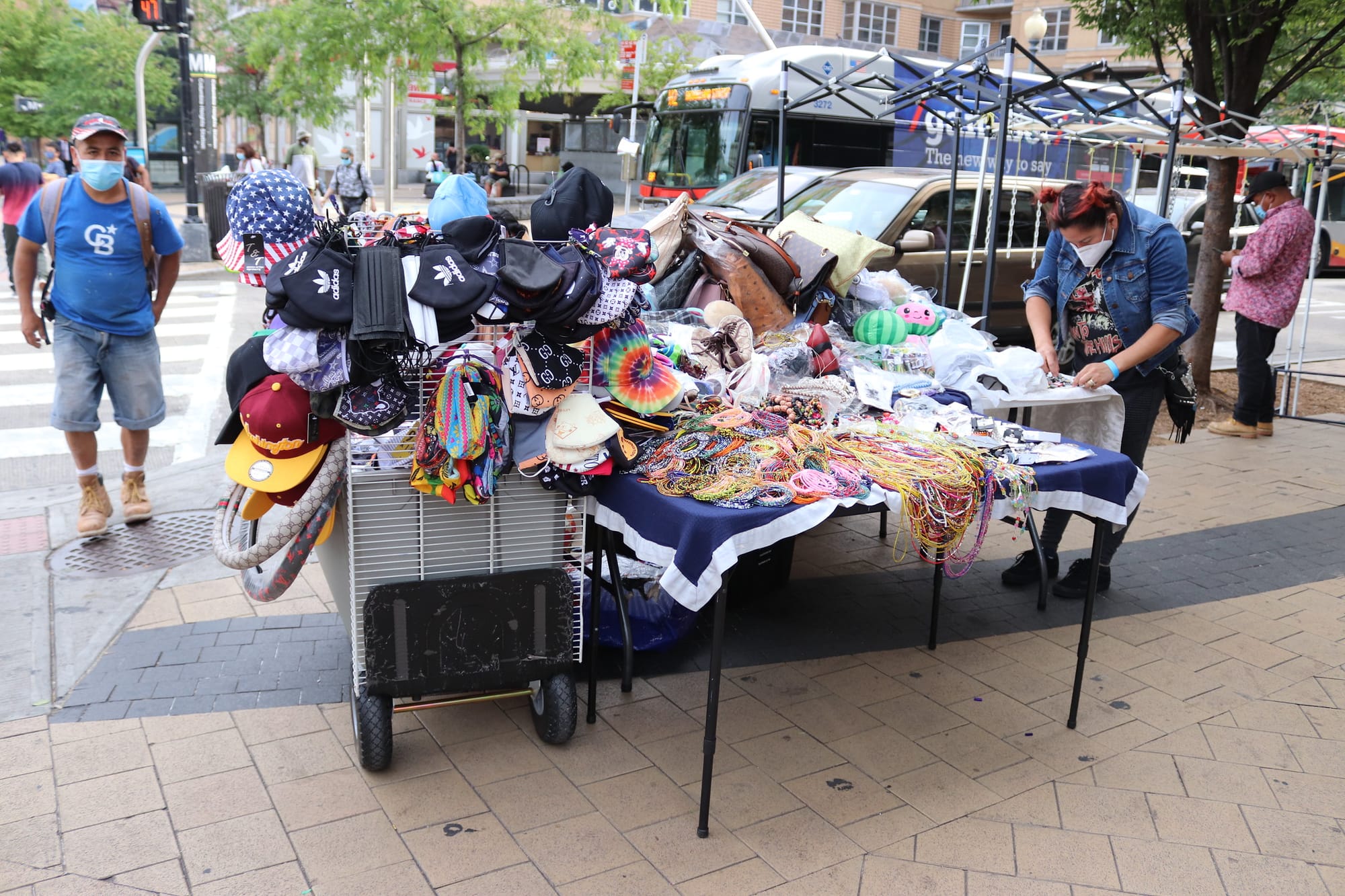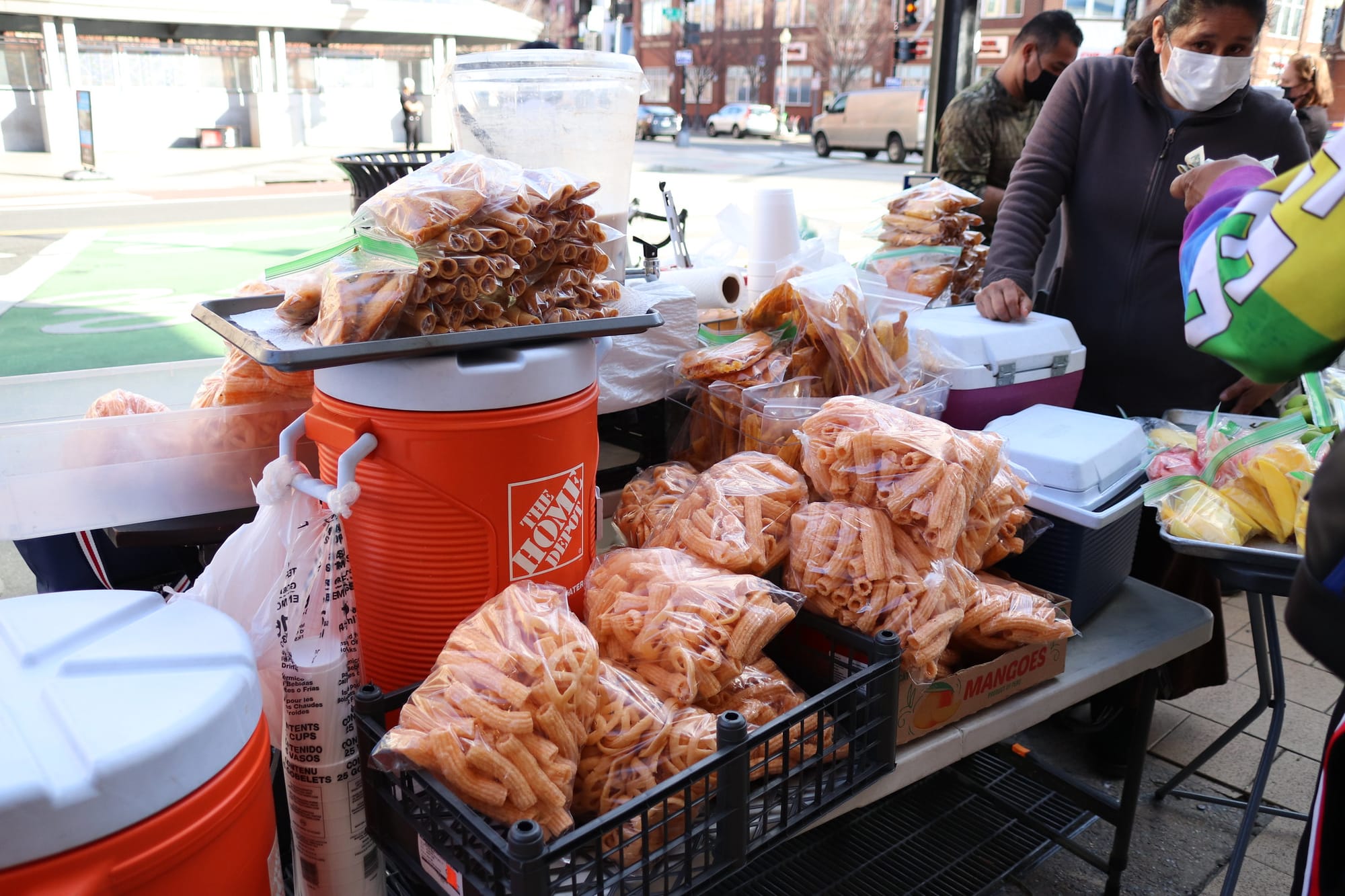Wilson Building Bulletin: To fight (Congress) or not to fight, that is the question
D.C.'s elected officials need to decide whether to defy Congress – or defer to it – over a tax bill.
It’s been 16 months since D.C. created a new process to license vendors in Columbia Heights and Mount Pleasant. So why are so few vendors licensed?

In April 2023, the D.C. Council passed a law meant to overhaul how the city regulates street vending. The legislation was supposed to be the solution to a long-standing problem in Columbia Heights and Mount Pleasant, where dozens of street vendors – most of them monolingual Spanish-speakers – sell goods without a license, leading to frequent run-ins with local police. Many vendors have been selling food or clothes in these historically Latino neighborhoods for years – some for decades.
“A number of our street vendors cannot legally vend in Columbia Heights, despite the fact that that’s where they want to be and where the community wants them to be and where they can contribute the most to our vibrant Columbia Heights neighborhood,” says Ward 1 Councilmember Brianne Nadeau, who introduced the bill.
The law decriminalized street vending, created an amnesty program for vendors who owed back taxes or other debts to the city, required DC Health to create a new type of permit for food vendors, and established a brand new “vending zone” in Columbia Heights and Mount Pleasant which specifically allows vendors to sell there. The area is supposed to be managed by a “vending zone manager” hired by the city.
“The idea is that it should be a bit like a farmer’s market, where the vending zone manager knows everybody in the zone, and they manage the space and keep people organized, and it has beautiful branding that says, ‘Welcome to the Columbia Heights Vending Zone,’” Nadeau says. “But as you can tell, none of that has happened.”
In the roughly 16 months since it officially took effect in Oct. 2023, only three vendors have gotten licensed under the new law. At the same time, the sidewalk on 14th Street in front of the DC USA shopping center, where vendors have always sold food and other goods, has gotten increasingly crowded, and competition for spots has led to conflict. There is currently no vending manager in the zone, after the D.C. Department of Licensing and Consumer Protection ended its contract with the previous manager several months early. In recent months, DLCP has put up “no vending” signs in a few areas of the vending zone and placed jersey barriers on some sidewalks (in an oversight hearing last week, DLCP Director Tiffany Crowe said these barriers were temporary).

The licensing process for many of these vendors has been a byzantine bureaucratic nightmare involving multiple city agencies that move slowly or give conflicting information, advocates say. By the time a vendor collects all the necessary pieces to complete the application for a license – including a certificate of "clean hands" from the city and, for food vendors, inspections from DC Health – it’s possible for the application to have expired. Some vendors have registered with the Office of Tax and Revenue, but have been unable to secure an actual license – so they're paying quarterly sales tax without being able to legally vend, advocates say. DC Health was also more than a year late in publishing certain permitting requirements under the new law, advocates added, making it impossible for food vendors to obtain a license. The licensing process also requires vendors to have email addresses, which many do not have. Language barriers add another layer of complication, particularly without the help of a vending manager.
The end result has been a labyrinthine process which has proved difficult for some vendors and legitimately impossible for others.
“I’ve tried on multiple occasions to bring all the agencies together in one room to work out a streamlined process, and I’ve gotten a lot of promises, but no results,” Nadeau says.
DLCP did not respond to a list of questions for this story, but a spokesperson said in a statement that the department has attempted to work with vendors to get licensed. "DLCP has engaged at multiple events with community partners, vendors, and residents. The District will continue to work with all stakeholders to expand access to our services, protect consumers, and expand opportunity," the statement said.
DC Health did not respond to a request for comment by publication time.
The complications are sowing mistrust with street vendors, several of whom advocated for years to pass a law so they could get licensed. “It’s so many lies. We get there and they change things around on us … When we went to fill out the application for our [vending] spots, they told us we can’t sell by Target and there’s no spots there. What’s the truth?” says Gloria Gomez, a vendor who’s been selling pre-packaged foods and fruits in Columbia Heights for 12 years. Gomez also says vendors have experienced an increase in enforcement from DLCP inspectors in the last several months. “They’re putting a lot of pressure on us,” she tells The 51st in Spanish.
In last week’s hearing, Director Crowe testified that DLCP inspectors are regularly out in hot-spot vending areas all over the city, and are not paying special attention to Columbia Heights.
Advocates say they believe the lack of progress implementing basic aspects of the 2023 law indicates a lack of support from the mayor's office. Mayor Muriel Bowser let the bill become law without her signature, and just months after it was implemented she said it should be reversed and suggested street vendors sell stolen goods.
“By not having a vending zone manager, DLCP is out of compliance with the law, and is creating confusion, scarcity, and the pretext to label the Columbia Heights/Mt. Pleasant Vending Zone a failure,” says Geoff Gilbert, the Legal and Technical Assistance Director at Beloved Community Incubator, which has been assisting vendors in trying to get licensed. (The city is in the process of putting out a request for proposal for the vending manager. There has been no manager since October 2024). (Disclosure: The 51st is a member of BCI's network of local cooperatives).
Bowser's office did not respond to a request for comment by publication time.
Director Crowe defended her agency’s work at last week’s oversight hearing at the D.C. Council, saying many Columbia Heights vendors are actually unwilling to get licensed. “The idea that everyone is really eager to get licensed and they just haven’t received help I think is disrespectful” to her staff, Crowe said, noting that more than 520 vendors got licensed in D.C. in 2024, and there were only four vending citations issued in Columbia Heights that year.
BCI, however, says it has a list of 40 vendors in Columbia Heights who actively want to get a license. “All vendors want is to be treated like any other business by DLCP, that has clear rules for how they can get a license, so that vendors can follow those rules and have security that inspectors and the police will stop harassing and threatening them with thousands of dollars in fines,” Gilbert says.
The administrative blocks to getting a license are two-fold, says Gilbert: First is that DC Health was more than a year late in publishing guidelines online for its microenterprise home kitchen permit, which only posted to the city’s website in December 2024. Before that, it was functionally impossible for vendors to get a license with this new type of permit created under the 2023 vending law, which is meant to regulate vendors who prepare food in their home kitchen to sell.
Second is complications surrounding the vendors’ site selection within the zone. The process to choose a site has been cumbersome, and it’s also changed over time: Just this month, Director Crowe told vendors they would no longer be choosing specific sites, and would instead be allowed to sell from any legal spot within the zone. (Vendors who have already chosen sites under the old system would be grandfathered in, Crowe said at the hearing). At the same time, DLCP has been putting up signs to denote that there are spots within the zone where vending is not allowed. “They need to publish their vending site plan and provide public clarity on why they’re using their discretion to allow vending in certain parts of the zone and not to allow sites in other parts of the zone,” Gilbert says.

Enrique Arias, a merchandise vendor who is licensed with a reserved spot, tells The 51st in Spanish that he’s frustrated that unlicensed vendors can take his spot. He says he would actually like more protection for licensed vendors, who sometimes face harassment from people on the street or get their spots stolen.
“It’s not fair that people who don’t have a license can set up right next to me and sell the same thing,” he says in Spanish.
However, Arias does not support what he views as harassment from inspectors, who he claims have spoken to his friends disrespectfully.
Now that the first few vendors in Columbia Heights have begun getting their licenses under the new law, advocates are hopeful they can get the ball rolling with others, though some structural barriers with language access, DOH requirements, and other elements of bureaucracy remain. Councilmember Nadeau says she would like to see a more streamlined licensing process that allows people to have a “one-stop” where they can get a sidewalk vending license. She’s also eagerly awaiting the arrival of the new vending zone manager, which she hopes will be able to create a truly thriving vending area on 14th Street.
“The goal is to have something beautiful that we can be proud of that supports the vendors,” she says.
This story has been updated with a statement from DLCP.
With your help, we pursue stories that hold leaders to account, demystify opaque city and civic processes, and celebrate the idiosyncrasies that make us proud to call D.C. home. Put simply, our mission is to make it easier — and more fun — to live in the District. Our members help keep local news free and independent for all: